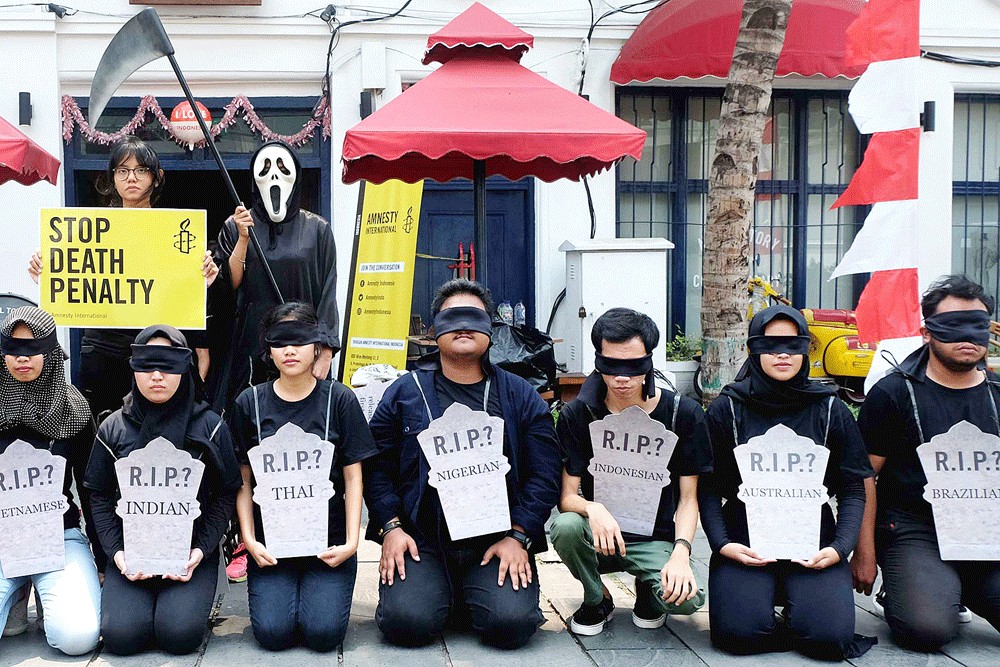Rights groups call on govt to abolish death penalty
Rights groups have called on the government to remove the death penalty from the country’s legal system, given the lack of sufficient evidence that it would deter other people from committing crimes and the high risk of wrongful conviction.
Change text size
Gift Premium Articles
to Anyone

R
ights groups have called on the government to remove the death penalty from the country’s legal system, given the lack of evidence that it would deter other people from committing crimes and the high risk of wrongful conviction.
Amid the COVID-19 pandemic, Indonesian judges continue to mete out capital punishments, mostly to drug convicts, with trials conducted via teleconference. Such practices, activists say, potentially put the due process of law at risk for the defendants.
As many as 129 convicts were sentenced to capital punishment between March 2020 and September 2021, according to data compiled by human rights watchdog Imparsial.
“At a time when people all over the world were trying to save lives during the COVID-19 pandemic, on the other side, there were people easily taking the lives of others [through death sentences],” said Imparsial researcher Amalia Suri on Monday.
She went on to add that online trials via videoconference had essentially compromised the rights of the defendants to have a fair trial, with technical glitches often hindering the hearing process.
Amalia called on the government to remove the death penalty from the penal code as it was not in line with the modern penal system that serves as an instrument for social correction.
“The spirit of capital punishment is an eye for an eye, which contradicts the modern goal of sentencing of acting as an instrument for social correction,” said Amalia.
According to Amnesty International Indonesia data, 117 new death sentences were handed out by the country’s judicial system in 2020, the highest figure since 2016 and in stark contrast to a 36 percent decline in capital punishment worldwide over the same period.
More than 85 percent of last year’s death sentences were given for drug-related offenses, while the rest were for murder, Amnesty International Indonesia’s data revealed.
Read also: Capital punishment on rise in Indonesia: Amnesty
Activists have attributed the large share of drug-related offenses in death sentences to the government’s tough stance on drugs, with President Joko “Jokowi” Widodo’s “war on drugs” narrative cited in some cases by the judges as considerations in sentencing drug offenders to death.
Jokowi declared a “drug emergency” in 2014, not long after he took office, calling for the death penalty for drug dealers and rejecting clemency pleas for convicted drug traffickers. It opened the doors for law enforcement officials to adopt a more aggressive stance on such crimes.
Indonesia executed 18 death-row drug inmates, including foreigners, between 2015 and 2016, drawing condemnation from the global community. The international reaction has prompted the country to put the execution of death row convicts on hold since 2017.
Despite the inhumane practice, capital punishment still retains popular support in the country. In a survey carried out by Kompas daily’s research and development department, more than half of the respondents supported the death penalty.
The survey, which was conducted between Oct. 5 and 8 and interviewed 509 respondents, revealed that more than 60 percent of the respondents who supported the death penalty cited the deterrent effect as the reason for supporting it.
Read also: People may change mind about death penalty, but government?
Amalia of Imparsial said the deterrent effect from the threat of capital punishment was a "myth", pointing out that many drug convicts on death row continued their illicit activities behind bars, considering that they had nothing left to lose.
Recognizing the complexity of the issue, the government offered a middle-ground solution in the proposed revision to the Criminal Code, with only special crimes to be punishable by death. This would be accompanied with a probationary period, during which the death sentence could be commuted to a life sentence if the convict showed good behavior.
The bill is currently listed on this year’s National Legislation Program (Prolegnas) priority list.
Commission for Missing Persons and Victims of Violence (Kontras) deputy coordinator Arif Nur Fikri said the proposed solution did not completely address the issues related to the death penalty and called on the government to fully remove such a sentence.
“In our view, the probationary period that could commute a death sentence to a life sentence does not adequately address the effectiveness of the death sentence, such as whether it could have a deterrent effect,” said Arif on Sunday.
The Law and Human Rights Ministry did not immediately respond to The Jakarta Post’s inquiry for the story.









